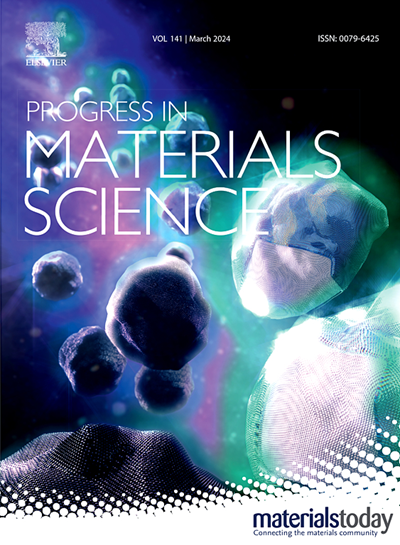Advancing ionic thermoelectric materials for heat recovery
IF 40
1区 材料科学
Q1 MATERIALS SCIENCE, MULTIDISCIPLINARY
引用次数: 0
Abstract
Ionic thermoelectrics (i-TEs) are emerging as a promising, sustainable technology for low-grade heat recovery, notable for their absence of moving mechanical parts. In recent years, significant advancements in i-TE materials and devices have been propelled by their advantages in thermal power generation, compatibility with room-temperature operation, and potential for integration into flexible, wearable devices. However, challenges remain to be addressed for practical future applications, primarily due to insufficient evaluations of innovative operational modes and materials. This review aims to bridge this gap by summarizing key existing theories and providing an in-depth analysis of ion migration mechanisms within i-TE capacitors. We also highlight significant contributions from leading studies, focusing on material selection, operational modes, performance characteristics, and pivotal discoveries. Ultimately, this review seeks to identify transformative approaches in i-TEs to foster innovative designs for practical applications.
热回收离子热电材料的研究进展
离子热电(i-TEs)正成为一种有前途的、可持续的低等级热回收技术,值得注意的是它们没有移动的机械部件。近年来,i-TE材料和器件在热发电、与室温操作的兼容性以及集成到灵活可穿戴设备中的潜力方面的优势推动了它们的重大进步。然而,由于对创新操作模式和材料的评估不足,未来的实际应用仍然面临挑战。本文旨在通过总结现有的关键理论和深入分析i-TE电容器中的离子迁移机制来弥补这一空白。我们还强调了主要研究的重要贡献,重点是材料选择,操作模式,性能特征和关键发现。最后,这篇综述试图找出i-TEs的变革方法,以促进实际应用的创新设计
本文章由计算机程序翻译,如有差异,请以英文原文为准。
求助全文
约1分钟内获得全文
求助全文
来源期刊

Progress in Materials Science
工程技术-材料科学:综合
CiteScore
59.60
自引率
0.80%
发文量
101
审稿时长
11.4 months
期刊介绍:
Progress in Materials Science is a journal that publishes authoritative and critical reviews of recent advances in the science of materials. The focus of the journal is on the fundamental aspects of materials science, particularly those concerning microstructure and nanostructure and their relationship to properties. Emphasis is also placed on the thermodynamics, kinetics, mechanisms, and modeling of processes within materials, as well as the understanding of material properties in engineering and other applications.
The journal welcomes reviews from authors who are active leaders in the field of materials science and have a strong scientific track record. Materials of interest include metallic, ceramic, polymeric, biological, medical, and composite materials in all forms.
Manuscripts submitted to Progress in Materials Science are generally longer than those found in other research journals. While the focus is on invited reviews, interested authors may submit a proposal for consideration. Non-invited manuscripts are required to be preceded by the submission of a proposal. Authors publishing in Progress in Materials Science have the option to publish their research via subscription or open access. Open access publication requires the author or research funder to meet a publication fee (APC).
Abstracting and indexing services for Progress in Materials Science include Current Contents, Science Citation Index Expanded, Materials Science Citation Index, Chemical Abstracts, Engineering Index, INSPEC, and Scopus.
 求助内容:
求助内容: 应助结果提醒方式:
应助结果提醒方式:


